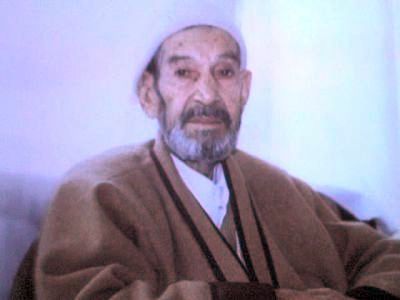
On
August 4, 2019, the 20th memorial day of Master Ahmet Kayhan, I was
asked to deliver a speech. The following text, with some changes,
contains the gist of it.
Elders, Brethren, Friends, Young ones, welcome. May God’s blessings be upon you all.
I have been asked to tell you about Master Ahmet Kayhan. This is an impossible prospect. I simply cannot explain Ahmet Kayhan to you, nor can anyone else. He had to be seen, to be experienced. However, I have been dragged before you by force, so it has become incumbent to say a few words.
Master Kayhan was a Perfect Human Being. It was from him that we learned how to be truly human, about what being human means. Not just run-of-the-mill human, but truly human (and humane). And although we did not succeed in becoming perfect ourselves, thanks to him, we—those who knew him—all became better people than we were before.
Now, we think we know what Islam means, but our knowledge of it is deficient. The Five Pillars of Islam, the Six Pillars of Faith: those are all right. But what about the rest? For the Prophet of God said: “I’ve come to perfect your ethics.” And ethics, too, we misunderstand—or rather, our understanding of it is also incomplete. We consider it to involve matters of honor, of chastity. But there’s also the ethics of commerce, there’s work ethics, there’s the ethics of family life ... You're going on the road, you come across a cat: do you kick it, or do you stroke its back?—there’s the ethics of that. So ethics is in everything.
We have to correct our external behavior if we want to rectify our inner world. Though it may seem counterintuitive, inner change can only take place if we change our conduct. We go from the outer to the inner. By improving our conduct, we improve our selves.
Master Kayhan taught us all this. And his love encompassed the whole universe. He said:
- “All the world, the whole universe is Muslim, no-one’s aware of the fact. If America or Russia were to say, ‘The sun belongs to us,’ you’d laugh, wouldn’t you? In the same way, Islam belongs to everyone.” That is, he didn’t restrict Islam solely to Muslims.
- “‘I came for all humanity.’ That’s what the Prophet says. ‘I came as light.’ Our Prophet is the [prophet] of the universe, not just of Muslims.”
- “The Quran is not the book of Islam, it is the book of the entire universe.”
inner change can only take place if we change our conduct.
Furthermore,
Master Kayhan was the Sage of the Age. That is, he was the wisest man
of our times. Just as the Prophet was the Messenger of God, Master
Kayhan was the messenger of the Prophet of God. He was the foremost
representative of Mohammedan moral conduct, the one person in our time who lived that morality to its fullest extent. Plus, we learned about both God and God’s Prophet from him. As the Sage of the Age, he also taught us about how to become a sage, a saint (a Friend of God). He pinpointed three essential conditions for this—sainthood in three steps: to close two doors and open one door. Do that, and there! You’re a saint.
1. To shun Illicit/Unclean Wealth, 2. to avoid Illicit/Unclean Lust, 3. to perform the Five Daily Prayers. And he gave examples for these.
These are all normal requirements of Islam. Actually, it would be better if children were taught these before they reach puberty.
First, Unclean Gain. You’re penniless, you’re in dire straits, you need to go to your uncle and ask him for a hundred bucks in order to put food on the table for your family. As you’re walking, you come across gold, jewels, thousands of dollars strewn on the ground. It’s a deserted stretch of road. You look right, there’s no one there, you look left, there’s no one there. Nobody will see you, nobody will know. (But God will!)
Under those conditions, you’re going to step over all that money, all the diamonds, and go ask your uncle for those hundred bucks.
Next, Unclean Lust. This is even more dangerous. Sex is permitted only within matrimony, within marriage to a spouse of the opposite sex. In all other cases, someone comes, excites your lust beyond endurance. If you can fend off their advances and send them away without hurting their feelings, perform two cycles of Prayer in thanksgiving, for you have just passed a most formidable test.
[On the other hand, there is no hindrance in marriage. As George Bernard Shaw once observed, marriage combines a minimum of interference with a maximum of opportunity.]
He says, “Yunus Emre, Rumi, all the Friends of God, became saints only after they did these.”
The third, performing the Formal Prayer or Five Daily Prayers, needs no explanation. Master Kayhan used to say, “Whoever does these three things, let them come to me and I’ll pin the promotion to sainthood on their lapel.” They’re saints, whether they know it or not.
Now, there’s much more that can be said about this, but I’d like to pass on to something of the utmost importance. Master Kayhan relates about his own master:
Fifty people a day used to visit Hajji Ahmet [Kaya] Efendi. He would listen to
troubles, he would fix the problem physically and spiritually, then he
would tell them all: ‘If you do good you do to yourself, if you do bad
you do to yourself [17:7]. Whatever you do, you do to yourself. Now
go.’ There’s a lot here. We were created for good. Let us do good, let’s
not do ill.
troubles, he would fix the problem physically and spiritually, then he
would tell them all: ‘If you do good you do to yourself, if you do bad
you do to yourself [17:7]. Whatever you do, you do to yourself. Now
go.’ There’s a lot here. We were created for good. Let us do good, let’s
not do ill.
He would also give an example. In the Upper Neighborhood of
Malatya [in Turkey], there lived a woman. Her son had gone to do his military
service. Now a majdhub (madman of God) used to live there, he would
wander all day saying, ‘If you do good, you do to yourself, if you do
bad, you do to yourself.’ He wandered like this for years.
His home was close to that widow lady, she became sick of his
calls. He gets up early in the morning, this is all he does. ‘Why,’ she
said, ‘this man is disturbing me.’ All by herself. A devil came! There’s
poisonous rat food, they give it to rats, she bakes bread on a hot plate
every morning, she said, ‘Let me put one or two in a pita [a kind of
bread], let me give it to him, let him go to hell! Let me get rid of his
voice.’
 Yes. And she did it! She got up early, she put lots of rat poison in the
Yes. And she did it! She got up early, she put lots of rat poison in the
bread, baked it on the hot plate and set it there.
She heard the majdhub’s voice. She grabbed it hot, she went to the
door. ‘Peace upon you. Take this and eat,’ she said, early in the morning.
He just looked: ‘If you do good, you do to yourself. If you do bad …’
That’s his sole speech, he never says anything else. He said, ‘Whatever
you do, you do to yourself,’ he took the pita from her and left.
He wandered around for a while. He was going along in the noon
heat, he would lie down in the cemetery when he got tired. He’s
wandering about with the pita in his hand, he goes to the cemetery to
the place where he’s going to sleep. He leaves that pita on a tombstone,
he doesn’t eat it.
The son of that woman was a soldier. The boy had obtained leave
and was coming home. The cemetery is along his way. He came, he saw
the bread there, he’s hungry. He knows the majdhub. He goes, ‘Peace
upon you,’ ‘Upon you peace.’ ‘Let me eat that bread, I’m hungry.’ ‘If
you do good, you do to yourself. If you do bad …’ The man doesn’t
say anything else!
Well, that’s something the boy’s known for a long time. He takes the
bread. He’s hungry. Before he’s finished half of it, thud! He falls on the
road.
Passers-by recognize him. ‘He’s that lady’s son.’ They inform her,
the woman comes running and spies half the pita in his hand. The
boy is dead. Half of it is in his hand! She tears out her hair, she throws
herself on the ground. ‘I did this myself, I brought it upon myself, I’m
not accusing anyone!’ They bring the funeral, they bury the corpse,
‘What is this, how did it happen?’ ‘This is how it happened,’ she says.
‘I did it myself. I was sick of the madman, I was going to shut him up,
I killed my own son.’
Malatya [in Turkey], there lived a woman. Her son had gone to do his military
service. Now a majdhub (madman of God) used to live there, he would
wander all day saying, ‘If you do good, you do to yourself, if you do
bad, you do to yourself.’ He wandered like this for years.
His home was close to that widow lady, she became sick of his
calls. He gets up early in the morning, this is all he does. ‘Why,’ she
said, ‘this man is disturbing me.’ All by herself. A devil came! There’s
poisonous rat food, they give it to rats, she bakes bread on a hot plate
every morning, she said, ‘Let me put one or two in a pita [a kind of
bread], let me give it to him, let him go to hell! Let me get rid of his
voice.’
 Yes. And she did it! She got up early, she put lots of rat poison in the
Yes. And she did it! She got up early, she put lots of rat poison in thebread, baked it on the hot plate and set it there.
She heard the majdhub’s voice. She grabbed it hot, she went to the
door. ‘Peace upon you. Take this and eat,’ she said, early in the morning.
He just looked: ‘If you do good, you do to yourself. If you do bad …’
That’s his sole speech, he never says anything else. He said, ‘Whatever
you do, you do to yourself,’ he took the pita from her and left.
He wandered around for a while. He was going along in the noon
heat, he would lie down in the cemetery when he got tired. He’s
wandering about with the pita in his hand, he goes to the cemetery to
the place where he’s going to sleep. He leaves that pita on a tombstone,
he doesn’t eat it.
The son of that woman was a soldier. The boy had obtained leave
and was coming home. The cemetery is along his way. He came, he saw
the bread there, he’s hungry. He knows the majdhub. He goes, ‘Peace
upon you,’ ‘Upon you peace.’ ‘Let me eat that bread, I’m hungry.’ ‘If
you do good, you do to yourself. If you do bad …’ The man doesn’t
say anything else!
Well, that’s something the boy’s known for a long time. He takes the
bread. He’s hungry. Before he’s finished half of it, thud! He falls on the
road.
Passers-by recognize him. ‘He’s that lady’s son.’ They inform her,
the woman comes running and spies half the pita in his hand. The
boy is dead. Half of it is in his hand! She tears out her hair, she throws
herself on the ground. ‘I did this myself, I brought it upon myself, I’m
not accusing anyone!’ They bring the funeral, they bury the corpse,
‘What is this, how did it happen?’ ‘This is how it happened,’ she says.
‘I did it myself. I was sick of the madman, I was going to shut him up,
I killed my own son.’
This really happened, sir. Hajji Efendi would tell this story, then he
would say: ‘Go and get along with each other.’
would say: ‘Go and get along with each other.’
(Henry Bayman, The Teachings of a Perfect Master (2012), pp. 443-45.)
A Koranic Verse: “Whoever does an atom’s-weight of good will see its recompense, whoever does an atom’s-weight of evil will see its recompense”
(99:7-8). About a Companion who promised he would live by this code,
the Prophet of God said, “Your friend has become one of the greatest men
of knowledge.” I entrust you to God.
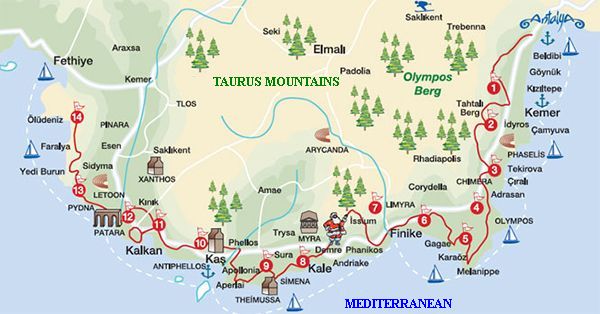

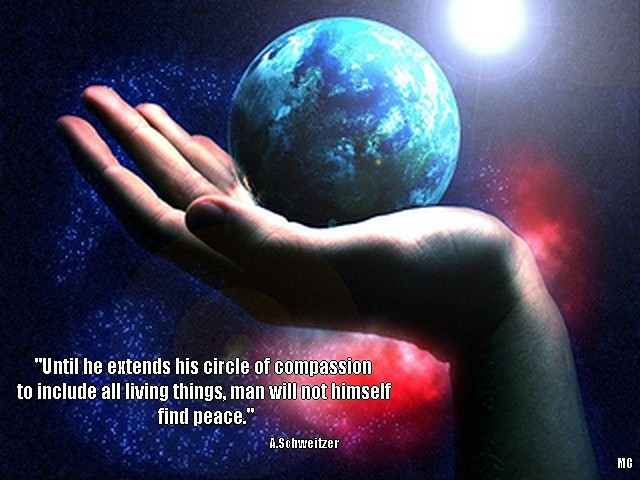
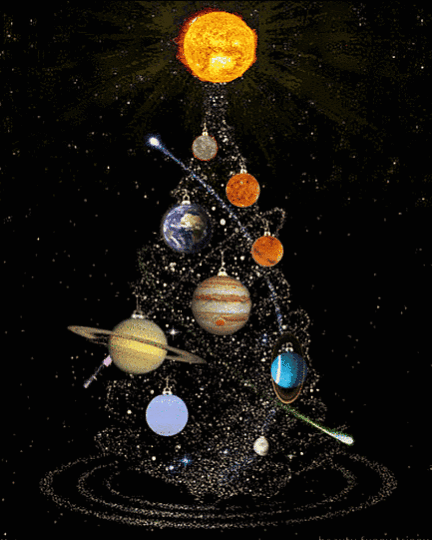 Today,
Sufis may be regarded as successors of Santa. Having said that, there
are some notable differences between Santa and the Sufis:
Today,
Sufis may be regarded as successors of Santa. Having said that, there
are some notable differences between Santa and the Sufis:  Henry
Corbin, an eminent scholar of Sufism, brought together various motifs
in his discussion of the cosmic mountain. In talking of the “journey to
the East,” he wrote:
Henry
Corbin, an eminent scholar of Sufism, brought together various motifs
in his discussion of the cosmic mountain. In talking of the “journey to
the East,” he wrote: 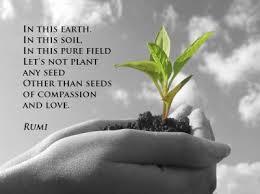 He
said: “We were very poor. I had no money to go to school. One day I
came here. When I told him my problem, your father gave me a lot of
money. He told me to use it for my education. When I objected, he
said:
He
said: “We were very poor. I had no money to go to school. One day I
came here. When I told him my problem, your father gave me a lot of
money. He told me to use it for my education. When I objected, he
said: 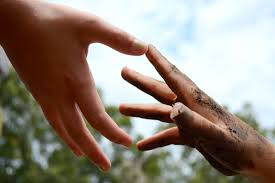 My
father called the house servant. “Bring me the phone,” he said. He
called [two highly-placed government officials he knew], asking them
to come at once.
My
father called the house servant. “Bring me the phone,” he said. He
called [two highly-placed government officials he knew], asking them
to come at once.  My mother raised them with a shovel, took them outside, and threw them on the snow.
My mother raised them with a shovel, took them outside, and threw them on the snow. 